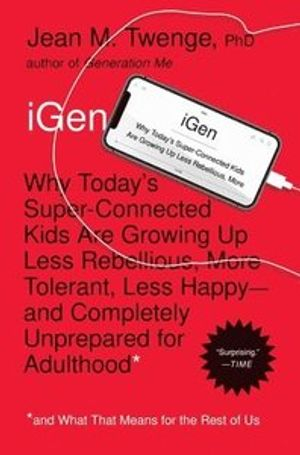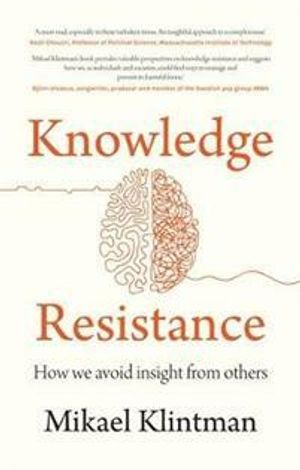

iGen
- Utgiven: 2018
- ISBN: 9781501152016
- Sidor: 352 st
- Förlag: Atria Books
- Format: Häftad
- Språk: Engelska
Om boken
“We’ve all been desperate to learn what heavy use of social media does to adolescents. Now, thanks to Twenge’s careful analysis, we know: It is making them lonely, anxious, and fragile—especially our girls. If you are a parent, teacher, or employer, you must read this fascinating book.”—Jonathan Haidt, author of The Anxious Generation
Born after 1995, they grew up with cell phones, had an Instagram page before high school, and cannot remember a time before the Internet. They are iGen. Now, here is crucial reading to understand how these children, teens, and young adults are vastly different from their millennial predecessors, and from any other generation.
With generational divides wider than ever, parents, educators, and employers have an urgent need to understand today’s rising generation of teens and young adults.
Born in the mid-1990s up to the mid-2000s, iGen is the first generation to spend their entire adolescence in the age of the smartphone. With social media and texting replacing other activities, iGen spends less time with their friends in person—perhaps contributing to their unprecedented levels of anxiety, depression, and loneliness.
But technology is not the only thing that makes iGen distinct from every generation before them; they are also different in how they spend their time, how they behave, and in their attitudes toward religion, sexuality, and politics. They socialize in completely new ways, reject once sacred social taboos, and want different things from their lives and careers. More than previous generations, they are obsessed with safety, focused on tolerance, and have no patience for inequality.
As this new group of young people grows into adulthood, we all need to understand them: friends and family need to look out for them; businesses must figure out how to recruit them and sell to them; colleges and universities must know how to educate and guide them. And members of iGen also need to understand themselves as they communicate with their elders and explain their views to their older peers. Because where iGen goes, so goes our nation—and the world.
*As seen in Time, USA TODAY, The Atlantic, The Wall Street Journal, and on CBS This Morning, BBC, PBS, CNN, and NPR*
Åtkomstkoder och digitalt tilläggsmaterial garanteras inte med begagnade böcker
Mer om iGen (2018)
I september 2018 släpptes boken iGen skriven av Jean M Twenge. Den är skriven på engelska och består av 352 sidor. Förlaget bakom boken är Atria Books.
Köp boken iGen på Studentapan och spara uppåt 23% jämfört med lägsta nypris hos bokhandeln.
Referera till iGen
Harvard
Twenge, J. M. (2018). iGen. Atria Books.
Oxford
Twenge, Jean M, iGen (Atria Books, 2018).
APA
Twenge, J. M. (2018). iGen. Atria Books.
Vancouver
Twenge JM. iGen. Atria Books; 2018.



















